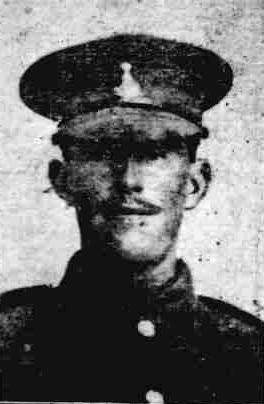Pte
Ernest Tindall
Informationen zu Geburt
|
Geburtsjahr: 1892 |
|
Geburtsort: Eskdaleside cum Ugglebarnby, Yorkshire, England, Vereinigtes Königreich |
Allgemeine Informationen
|
Beruf: Landwirt / Bauman / Ökonom |
Informationen zum Armeedienst
|
Land: England, Vereinigtes Königreich |
|
Truppe: British Expeditionary Force |
|
Rang: Private |
|
Dienstnummer: 203859 |
|
Einberufung ort: Whitby, Yorkshire, England, Vereinigtes Königreich |
|
Einheiten: — Alexandra Princess of Wales's Own (Yorkshire Regiment), 10th Bn. (Letzte bekannte Einheit) |
Informationen zu Tod
|
Sterbedatum: 23/10/1917 |
|
Sterbeort: Judge Cross Roads, Belgien |
|
Todesursache: Im Kampf gefallen |
|
Alter: 25 |
Gedenkstätte
|
Tyne Cot Memorial Tafel: 54 |
Auszeichnungen und Orden 2
|
British War Medal Medaille |
|
Victory Medal Medaille |
Punkte von Interesse 3
| #1 | Geburtsort | ||
| #2 | Einberufung ort | ||
| #3 | Ort des Todes (ungefähr) |
Meine Geschichte
Ernest Tindall was born in 1892 in Eskdaleside cum Ugglebarnby, in the North Riding of Yorkshire. He joined the army in February 1917. At the time of his enlistment Ernest was farming with his father. He served with the 10th Battalion Alexandra Princess of Wales's Own (Yorkshire Regiment), part of the 62nd Brigade of the 21st Division.
After having seen action on the 4th of October 1917, Ernest’s Battalion marched off to the hinterland for some well-deserved rest. On the 21st of October, the 10th Yorkshires left camp for another tour in the frontlines. After a brief rest at Zillebeke Lake, just south of Ypres, the Battalion moved towards the frontlines in front of Joiners Rest and Journal Wood, relieving the 8th Battalion York and Lancaster Regiment.
Relief was completed without casualties and the companies of the Battalion moved into position. “A” Company being in the right frontline, took up positions near Judge Cross Roads, “D” Company in the left frontline, was positioned at ‘In de Ster Cabaret’. “B” and “C” Company lay in support. “B” Company took up positions in the Jay Barn - Jubilee Croft area, while “C” Company held the Jolting Houses area.
On the 23rd of October, low flying German aeroplanes flew over the frontline, mapping the Yorkshires’ positions. As a result the German artillery shelled the front and support trenches of Ernest’s Battalion, causing heavy casualties. One of them was 26-year-old, Ernest Tindall. According to a letter from Ernest’s Captain to his parents: Ernest was killed in the trenches on the 23rd of October 1917, being hit by a piece of shell. The young man from Danby, North Yorkshire, died after barely three months at the front. He was buried by his comrades in the trenches where he died. Though Ernest was interred in 1917, his grave went lost in the further fighting, or his remains couldn’t be positively identified after the War. Ernest is now remembered on the Tyne Cot Memorial.
After having seen action on the 4th of October 1917, Ernest’s Battalion marched off to the hinterland for some well-deserved rest. On the 21st of October, the 10th Yorkshires left camp for another tour in the frontlines. After a brief rest at Zillebeke Lake, just south of Ypres, the Battalion moved towards the frontlines in front of Joiners Rest and Journal Wood, relieving the 8th Battalion York and Lancaster Regiment.
Relief was completed without casualties and the companies of the Battalion moved into position. “A” Company being in the right frontline, took up positions near Judge Cross Roads, “D” Company in the left frontline, was positioned at ‘In de Ster Cabaret’. “B” and “C” Company lay in support. “B” Company took up positions in the Jay Barn - Jubilee Croft area, while “C” Company held the Jolting Houses area.
On the 23rd of October, low flying German aeroplanes flew over the frontline, mapping the Yorkshires’ positions. As a result the German artillery shelled the front and support trenches of Ernest’s Battalion, causing heavy casualties. One of them was 26-year-old, Ernest Tindall. According to a letter from Ernest’s Captain to his parents: Ernest was killed in the trenches on the 23rd of October 1917, being hit by a piece of shell. The young man from Danby, North Yorkshire, died after barely three months at the front. He was buried by his comrades in the trenches where he died. Though Ernest was interred in 1917, his grave went lost in the further fighting, or his remains couldn’t be positively identified after the War. Ernest is now remembered on the Tyne Cot Memorial.
Quellen 4
|
Ancestry https://www.ancestry.co.uk/ Verwendete Quellen |
|
CWGC https://www.cwgc.org/find-war-dead/casualty/827826/tindall,-ernest/ Verwendete Quellen |
|
Long Long Trail http://www.longlongtrail.co.uk/army/order-of-battle-of-divisions/21st-division/ Verwendete Quellen |
|
War Diary http://www.nmarchive.com/ Verwendete Quellen |
